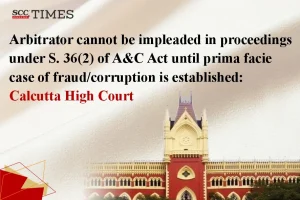Calcutta High Court: While adjudicating upon an interlocutory application seeking impleadment of arbitrator to the proceedings under Section 36(2) of the Arbitration and Conciliation Act, 1996 (‘Arbitration Act’), a Single Judge Bench of Aniruddha Roy, J*, held that where allegations of fraud or corruption have been raised against an arbitrator, the arbitrator cannot be impleaded to the proceedings until a prima facie case of fraud or corruption is established against him.
Background
The West Bengal Industrial Development Corporation Ltd. (award-debtor) applied for setting aside the arbitral award dated 30-10-2023 under Section 34 of the Arbitration Act. During the pendency of the same, the award-debtor filed an independent application under Section 36(2) of the Arbitration Act praying for unconditional stay on operation of the award.
In the Section 36(2) application, the award-debtor had raised allegations of bias against one of the three members of the Arbitral Tribunal citing incidents where the arbitrator in question has attended launching programs hosted by Tata Motors (award-holder).
The present case is an interlocutory application which was moved by the award-debtor during the hearing of Section 36(2) application.
The primary bone of contention in this case was whether the arbitrator could be impleaded without determination of prima facie finding of fraud, corruption or bias.
Arguments and Contentions
The counsel for the award-debtor referred to Section 36(3) of the Arbitration Act which states that if the court is satisfied that a prima facie case is made out, that the making of the award was induced or effected by fraud or corruption, the Court shall stay the award unconditionally till the challenge of award under Section 34 is not disposed of.
According to the counsel for the award-debtor, bias is an element of fraud, and therefore, the expression in Section 36(3) necessarily includes bias in the ambit of fraud. He further stated that since the allegation of fraud has been raised, the arbitrator concerned must be impleaded to enable the Court to effectively and completely adjudicate upon the questions raised. To implicate bias, the counsel for the award-debtor referred to several incidents of the arbitrator concerned attending launch shows held by the award-holder during the pendency of the award.
Per contra, the counsel for the award-holder contended that the filing of the present interlocutory application is nothing more than a delaying tactic and has been filed as an afterthought. He further submitted that the ground of bias is not included within the ambit of the second proviso of Section 36(3), which clearly codifies only fraud and corruption. Additionally, he contended that when fraud is alleged against an arbitrator, the arbitrator concerned must be impleaded at the setting aside proceeding so that he can deal with the charge against him.
Decision
The Court noted that the scope of adjudication of fraud under Sections 34 and 36(2) and (3) were completely different. In Section 34 proceeding, the Court can adjudicate upon whether the award can be vitiated on the ground of fraud or corruption and/or the ground of bias alleged against the Arbitral Tribunal. On the contrary, when unconditional stay under Section 36(2) is prayed for, the Court must look at fraud or corruption alleged against the Tribunal in context of Section 36(3). At the stage of setting aside under Sections 36(2) and (3), the Court must be satisfied of a prima facie case of fraud or corruption.
Accordingly, the Court held that unless the Court arrives at a prima facie finding of fraud, corruption or bias, the question of impleadment of concerned arbitrator did not and could not arise. The Court stated that while adjudicating Section 36(2) application, it would decide whether a prima facie case of fraud, corruption or bias has been made, so that there can be an order for unconditional stay of the arbitral award. Until that application was finally adjudicated upon its merits, no order for impleadment of the arbitrator concerned could be made.
It is noteworthy that the Court refused to adjudicate upon the inclusion of the word ‘bias’ within the element of fraud and left it open to be considered at a more appropriate stage.
The Court held that the present interlocutory order was premature and dismissed it accordingly.
[West Bengal Industrial Development Corpn v. Tata Motors Ltd., 2025 SCC OnLine Cal 4969, decided on 19-6-2025]
Judgement authored by- Justice Aniruddha Roy
Advocates who appeared in this case :
For the award-holder: Sudipto Sarkar, Siddhartha Mitra (Sr. Advocate), Deepan Kr. Sarkar, Samridha Sen, Soumitra Datta, Advocates
For the award-debtor: Kishore Datta (Advocate General), T.N. Siddique, Manoj Kumar Tiwari, Mr. Deepank Anand, Arpita Dey, Advocates


